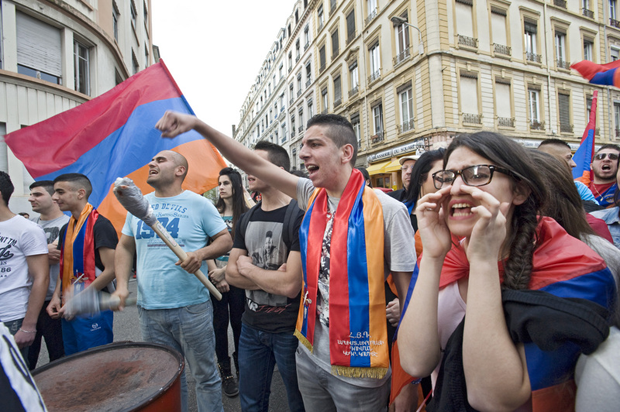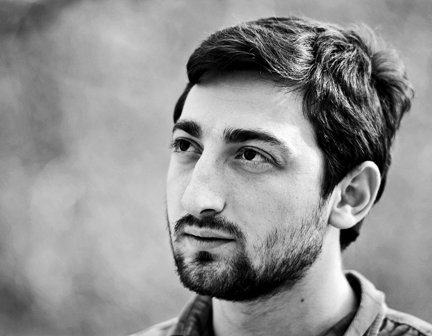Index relies entirely on the support of donors and readers to do its work.
Help us keep amplifying censored voices today.

Eurovision contestant Teo, in the music video for this year’s Belarusian entry Cheesecake (Image: Yury Dobrov/YouTube)
If you want a Eurovision of the future, imagine a faux-dubstep bassline dropping on a human falsetto, forever. That was how it felt watching YouTube footage of this year’s entrants in the continent’s greatest song-and-dance-spectacle.
The Eurovision Song Contest, born of the same hope for the future and fear of the past as the European Union, is approaching its 50th year. And strangely, it’s doing quite well. In spite of fears that the competition would end up as an annual carve up between former Soviet states, recent years have in fact seen a fairly equal spread of winners throughout the member states of the European Broadcasting Union (who do not actually have to be in Europe; a fact often missed by anti-Zionists who somehow see a conspiracy in the fact that Israel is a regular entrant in the competition is that channels in countries such as Libya, Jordan and Morocco are also members of the EBU, and technically could enter if they wish. Morocco did, in 1980). Since 2000, the spread of winners between Western Europe, the former Soviet states, and the Balkans and Turkey have been pretty much even.
While some of the geopolitics will always be with us — Turkey and Azerbaijan united in their hatred of Armenia, Cyprus and Greece douze-pointsing each other at every opportunity — the once-derided contest has in fact functioned as a genuine competition. Year in, year out, the best song in the competition tends to win, while the laziest entrants, not taking the event seriously as a songwriting competition (yes, we’re looking at you, Britain), tend to fall behind and then complain that Europe doesn’t “get” pop music.
The best songs and singers triumph, by and large. But Eurovision still does have a political edge.
Take Tuesday’s semi-final in Copenhagen. Russia’s entry, Shine, performed by the Tolmachevy Sisters and described by Popbitch as sounding like “almost every Eurovision song you’ve ever imagined” contained some unintentionally ominous lines:
Living on the edge / closer to the crime / cross the line a step at a time
Add an “a” to the end of that “crime”, and you’ve got the Kremlin’s current foreign policy neatly summed up in a single stanza.
I am not suggesting that the Tolmachevys were sent out to justify Putin’s expansionism. Nonetheless, the Copenhagen crowd were keen that Russia should know what the world thought of its foreign policy and domestic human rights record: as it was announced that Russia had made Saturday’s grand final, the arena erupted in jeering. The dedicated Eurovision fan is clearly not just a poppet living in a fantasy world of camp. They are engaged with the world, and particularly the regressive policies of countries such as Russia, Azerbaijan and Belarus, perhaps more so than your average European.
When Sweden’s Loreen won the competition in Baku, capital of Azerbaijan, in 2012, she pledged to meet the country’s human rights activists. That same year, BBC commentator “Doctor Eurovision” (he actually is a doctor of Eurovision) made explicit references to Belarus’s disgraceful dictatorship, rather than simply giggle at the funny eastern Europeans.
This raises an interesting question about how we engage with dubious regimes.
Before the Baku Eurovision in 2012, there was some discussion over whether democratic countries should boycott the competition, sending a message to Aliyev’s regime.
“No,” Azerbaijani civil rights activists told Index on Censorship. “Let the world come and see Azerbaijan.” They felt that for most of the world, most of the time, they are citizens of a far away country of whom we know nothing. They wanted to take their chance while the world was looking. I think they got it right. As discussed last week, Azerbaijan is engaged in a massive international PR campaign, but to most people in the world since that Eurovision and the attention it raised for the country’s opposition, it has not been able to entirely disguise its atrocious record on free speech and other rights.
On Friday, the International Ice Hockey Federation’s world championship will open in Belarus. Though there was some discussion of boycotting that event, it has died down. Nonetheless, journalists from Europe and North America will be covering the event, and fans will travel too.
Belarus’s macho dictator Alexander Lukashenko is a keen ice hockey fan, and will be aiming to sweep up the glory of hosting a major international sporting event, not long after the country hosted the world track cycling championships in 2013.
Ice hockey fans and sports journalists are generally not the type of people who go in for Eurovision. But maybe they should try to take a leaf out of the Song Contest supporters book. Have a look at the country around them, learn a little about the politics, and spread the word about the side the dictators don’t want us to see.
Autocrats try to use these international competitions to control the world’s view of them. We should beat them at their own games.
This article was posted on May 8, 2014 at indexoncensorship.org

Armenian protesters in Lyons accused Turkey of supporting Islamic rebels in an attack on Kessab, an Armenian majority town located in Syria, on the Turkish border. (Image: Benjamin Larderet/Demotix)
It is, as Zhou Enlai might have said, probably too early to tell how significant Tayyip Erdogan’s comments alluding to the Armenian genocide will be.
The Turkish prime minister seems to have broken one of his country’s great taboos. In a statement translated into nine languages, the AK leader said: “It is with this hope and belief that we wish that the Armenians who lost their lives in the context of the early 20th century rest in peace, and we convey our condolences to their grandchildren.”
“Having experienced events which had inhumane consequences — such as relocation — during the First World War, should not prevent Turks and Armenians from establishing compassion and mutually humane attitudes among towards [sic] one another.”
According to Anadolu, Turkey’s state news agency, Erdogan also commented: “In Turkey, expressing different opinions and thoughts freely on the events of 1915 is the requirement of a pluralistic society as well as of a culture of democracy and modernity.”
This is not, you will have noticed, an apology. Offering condolence is not at all the same as expressing remorse. Though some would say it is not Erdogan’s duty to express remorse; he is the prime minister of the modern republic of Turkey, not the Ottoman Empire under which the alleged slaughter of over 1.5 million Armenian Christians in 1915 took place.
And some are utterly contemptuous of Erdogan’s statement: Reuters quotes the Armenian National Committee of America describing the statement as an “escalation” of Turkey’s “denial of truth and obstruction of justice”.
But let us assume that a) Erdogan is in a position to speak for Turkey past as well as present, and b) there is, at the kernel of this, an attempt at reconciliation with Armenia and the Armenian diaspora.
The very mention of the events are significant against the backdrop of the Turkish Penal Code’s controversial Article 301, which forbids insulting “the Turkish nation”. That law has in the past, effectively barred discussion of the genocide, and created a environment where simply identifying as Armenian within Turkey was seen as a provocative act.
The most famous victim of this culture was Hrant Dink, the editor of Agos who was assassinated in January 2007.
Dink saw himself as Turkish-Armenian, and his newspaper was bilingual. He was a firm believer in the potential for dialogue in bringing some reconciliation between Turks and Armenians. He also believed such dialogue could only take place in an atmosphere free of censorship, to the extent that he vowed that he would be the first person to break a proposed French law making denial of the Armenian genocide a crime (a cheap political trick aimed at both currying favour with the Armenian community in France and creating a barrier for Turkey’s proposed entry into the EU).
Ultimately, Dink believed that progress could only be made if we were able to talk freely and access historical debate without impediment or fear.
History, like science, is a process rather than a dogma. And like science, one’s interpretations of history can vary based on both the evidence available and the prevailing mood.
For a long time after the creation of the Irish state, for example, the teaching of history in schools was simple. I recall one primary school history text which seemed to consist entirely of tales of the terrible things foreigners had done to the Irish: first the Vikings, then the Normans, and finally the English. The book finished pretty much where the 1919 War of Independence began. The last page featured the words of the national anthem and a picture of the national flag.
Sympathetic portrayals of English people, and British soldiers in particular, were thin on the ground — Frank O’Connor’s tragic short story Guests of the Nation being one of the very few.
Since the late 1990s peace process, both fictional and historical perspectives on Ireland’s relationship with Britain have changed. Some of the novels of Sebastian Barry, for example, attempt to tell stories of people who were neglected and even vilified in nationalist, Catholic, post-independence Ireland. Part of the plot of Paul Murray’s Skippy Dies has a Catholic school history teacher attempting to get his pupils interested in Irish soldiers who fought for Britain in World War I. Meanwhile, a recent book by nationalist historian Tim Pat Coogan, attempting to paint the Irish potato famine as deliberate genocide rather than cruel neglect, was given short shrift, in spite of the fact that this would have been a mainstream view until relatively recently — one must only listen to the sickly sentimental lyrics of rugby anthem The Fields of Athenry, penned in the 1970s, to understand the appeal of that victim status to the Irish imagination. Wrongs were certainly done in Ireland, but the relationship between the two nations was a hell of a lot more complex than the oppressor/oppressed line that was spun for so many years.
There was no official sanction on differing views of Anglo-Irish relations, but politics permeated the debate. Likewise with the recent intervention of British education secretary Michael Gove on the issue of how World War I is taught in schools. Gove claimed that the idea of a pointless war in which a moribund (figuratively) ruling class led moribund (literally) working class boys to their graves was a modern lefty invention. He was wrong, in that that view had been common even in the 1920s, but his opponents were equally adamant in their insistence that there could only be one view of World War I. None of this discussion was accompanied by new evidence on either side.
At the extreme end of this hyper-politicisation of history are the Holocaust denial laws of many European countries, and laws on glorification of the Soviet era in former Eastern bloc.
In his cult memoir Fuhrer-Ex, East German former neo-nazi Ingo Hasslebach described how, growing up in the DDR, with its overwhelming anti-fascist narrative, nazi posturing was the ultimate rebellion. In the modern era, France’s prohibition on nazi revisionism has led some young north African immigrants, alienated from the French nation state, to see anti-semitism and the quasi-nazi quenelle gesture as the ultimate “fuck you” to the authorities.
Taboos about discussing events of the past breed bad history and bad politics. For the sake of Turkey, and the rest of us, Erdogan should be held to his words on the necessity of free speaking and free thinking.
This article was originally posted on 24 April 2014 at indexoncensorship.org
 As Armenia prepares to celebrate its status as UNESCO World Book Capital, one young author has found himself in hot water after a penning a literary work which references the conditions faced by the country’s mainly conscript army. Threatened with prosecution under article 263 of the former Soviet republic’s Criminal Code, 24-year-old Hovhannes Ishkhanyan could face up to two years in prison for Demob Day.
As Armenia prepares to celebrate its status as UNESCO World Book Capital, one young author has found himself in hot water after a penning a literary work which references the conditions faced by the country’s mainly conscript army. Threatened with prosecution under article 263 of the former Soviet republic’s Criminal Code, 24-year-old Hovhannes Ishkhanyan could face up to two years in prison for Demob Day.
Despite having a print run of just 300, of which only 120 copies have sold, the Armenian military maintains that the short-story collection is insulting to itself and also to the Armenian Orthodox Church and the mothers of soldiers.
Ishkhanyan’s supporters allege that the army has been embarrassed in the last few years by stories of harassment, hazing and non-combat deaths. Activists accuse the military of failing to properly investigate abuse, and portraying murders as suicides.
Of the 16 fictional stories in the “The Day of Discharge” three examine hazing rituals, and abuse in the army.
The issue is particularly sensitive in Armenia, still effectively in a state of war with neighbouring Azerbaijan. Only 32 of 228 conscripts who have died between 2007 and 2011 were killed by enemy fire according to official statistics quoted by the local Armenian media, and in recent years videos uploaded to YouTube showing the abuse of conscripts have angered the public.
In response to criticism in October 2011, the Armenian Defence Minister, Seyran Ohanyan announced that he “considers the non-stop deliberate manipulations of army issues by certain groups to be unacceptable. […] From now on, the Defense Ministry will be most strict with those defaming our army.” Writers and human rights activists believe Ishkhanyan’s troubles mark an attempt to close down public debate on the issue.
Two local bookshops have pulled the title from their shelves although one other continues to sell it and on 27 February Ishkhanyan was nonetheless called in for questioning. “I did not make a stir thinking they would not call me and everything would smooth down but they did not and transferred the case to the Central Department of Yerevan police. I was called there and asked the same questions,” the author told online publication Armenia Now.
“First they raised the question of the army then they understood they couldn’t subject me to any liability and now they say that my works contain pornographic scenes and they have applied to the Ministry of Culture,” he explained, adding that the only article a criminal case can be brought is Article 263 of the RA Criminal Code dealing with pornographic materials and which carries with it the possibility of two months to a maximum of two years imprisonment.
Ishkhanyan was questioned for a second time on 24 March, the book’s publisher was interrogated on 4 April.
“[W]e don’t see any legal grounds for prosecution. This can be assessed by us as censorship later, but I cannot make comments today since we have only just received an application from Hovhannes Ishkhanyan and the case is in progress,” Armenia’s Human Rights Ombudsperson Karen Andreasyan told the Aravot newspaper.
Writers in the Armenian Diaspora have come to Ishkhanyan’s defence, with two, Nancy Agabian and Nancy Krikorian launching a petition in Ishkhanyan’s defence.
“Literature is one means by which an open society examines, discusses and debates the problems it faces,” the prominent authors wrote. “A celebration of the five hundred year anniversary of books in Armenia rings hollow at this time when even one book, dealing with a timely and crucial issue of Armenian society, does not have a chance of being read.”
Speaking to Index, the author’s father, established investigative journalist Vahan Ishkhanyan, noted the more personal repercussions of the furore:
Because the affair is still open Hovhannes and his relatives are under permanent stress. During the Soviet era many writers were under pressure in Armenia, but this is the first time in 20 years of independence that they are trying to file a case for a work of fiction.
Onnik Krikorian is a British journalist and photojournalist based in Armenia and regional editor for the Caucasus at Global Voices Online. His work has appeared in the Los Angeles Times, New Internationalist, Scotsman and the Institute for War & Peace Reporting, among others, and he regularly fixes for Al Jazeera English, BBC and the Wall Street Journal. He tweets at @onewmphoto.
An appeals court in Armenia has upheld a libel ruling against a daily newspaper. The family of former President Robert Kocharian, took the newspaper Zhamanak to court in December, following its publication of a series of articles, linking Kocharian’s wife, Bella, with major trade in medicines and claiming that their older son, Sedrak, owns diamond mines in India, and had defrauded an Armenian businessman. The pro-opposition newspaper was ordered to pay 3m drams ($8,000) in damages.